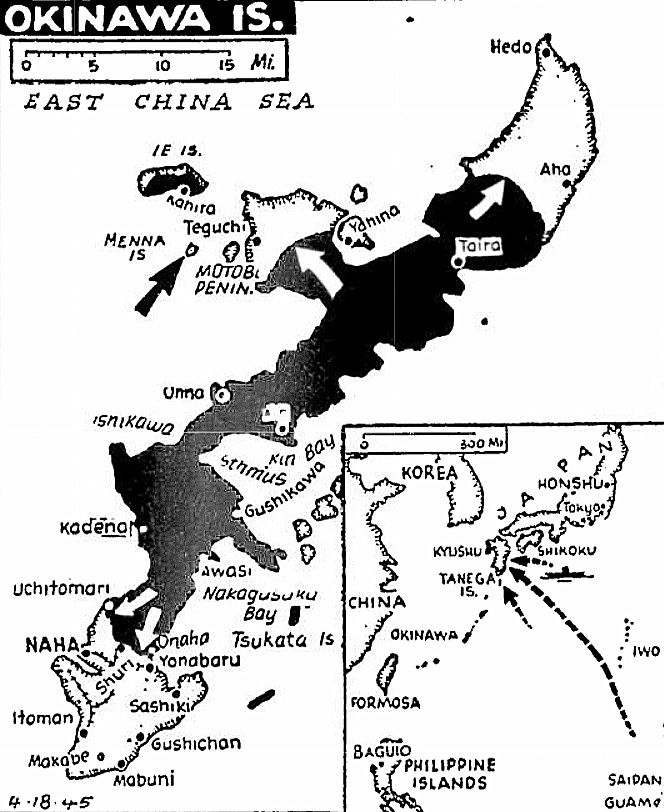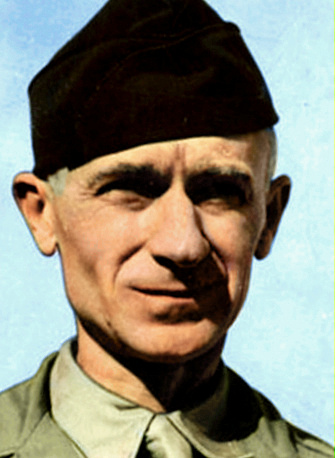Ernie’s father, Aunt Mary stunned at news of death
Neighbor hears news on radio and informs family on Indiana farm
DANA, Indiana (UP) – William C. Pyle, father of war correspondent Ernie Pyle, and the writer’s “Aunt Mary” – Mrs. Mary Bales – were stunned today by word of his death.
Mrs. Ella Goforth, a neighbor, said the aging relatives of the famed newspaperman received word from another neighbor woman who heard the news on the radio.
“They’re just not able to talk about it now,” Mrs. Goforth said in a phone conversation from the Pyle farm home, near the Indiana-Illinois state line.
“They’re not taking the news very well.”
Mrs. Nellie Hendricks, who lives across the field from the Pyle home, heard the first news of Ernie’s death. She ran across the field to tell the writer’s father and his aunt. Then they turned on their own radio and heard the news, according to Mr. Goforth.
She said:
Mr. Pyle had a letter from Ernie about two weeks ago. That was the last word they had from him. He told them he thought he’d be home sooner than he’d expected – but of course, he didn’t know about this.
Tribute from Time –
‘It will be a long time before Americans forgot Ernie Pyle’s war’
Wednesday, April 18, 1945
The following widely-quoted tribute to Ernie Pyle appeared in Time Magazine:
…He is the most popular of them all. His column appears six days a week in 310 newspapers with a total circulation of 12,255,000. Millions of people at home read it avidly, write letters to him, pray for him, telephone their newspapers to ask about his health and safety.
Abroad, G.I.’s and generals recognize him wherever he goes, seek him out, confide in him. The War Department and the high command in the field, rating him a top morale-builder, scan his column for hints. Fellow citizens and fellow newsmen have heaped honors on him.
Wrote of small people
What happened to Ernie Pyle was that the war suddenly made the kind of unimportant small people and small things he was accustomed to write about enormously important.
Many a correspondent before him had written of the human side of war, but their stories were usually about the heroes and the exciting moments which briefly punctuate war’s infinite boredom.
Ernie Pyle did something different. More than anyone else, he has humanized the most complex and mechanized war in history. As John Steinbeck has explained it:
“There are really two wars and they haven’t much to do with each other. There is the war of maps and logistics, of campaigns, of ballistics, armies, divisions and regiments – and that is Gen. Marshall’s war.”
War of common men
“Then there is the war of homesick, weary, funny, violent, common men who wash their socks in their helmets, complain about the food, whistle at Arab girls, or any girls for that matter, and lug themselves through as dirty a business as the world has ever seen and do it with humor and dignity and courage – and this is Ernie Pyle’s war. He knows it as well as anyone and writes about it better than anyone.”
One reason that Ernie Pyle has been able to report this little man’s war so successfully is that he loves people and, for all his quirks and foibles, is at base a very average little man himself.
Understands men
He understands G.I. hopes and fears and gripes and fun and duty-born courage because he shares them as no exceptionally fearless or exceptionally brilliant man ever could. What chiefly distinguishes him from other average men is the fact that he is a seasoned, expert newsman. His dispatches sound as artless as a letter, but other professionals are not deceived. They know that Ernie Pyle is a great reporter.
…In his unique way, he is almost sure to be a sort of national conscience. He may be that even if he is killed in battle. For if Ernie Pyle should die tomorrow, as well he may, it would still be a long time before Americans forgot Ernie Pyle’s war.
G.I.’s hardest hit by death of Pyle
Overseas veterans feel loss keenly
Wednesday, April 18, 1945
Ernie Pyle’s death was a shock to the nation, but it hit hardest the men wearing those overseas service ribbons.
Servicemen and civilians alike were shocked by the word of his passing today, but on Pittsburgh’s streets, in the USO canteen, in drug stores and in public buildings it was the man in uniform who felt the keenest loss.
Met him in Italy
Pvt. William McGonigal of Montgomery County sat in the Canteen and stared at the floor when he heard the news. Then he said:
I shook hands with him near the Volturno River in Italy. He wrote about our outfit making the crossing. He was the one correspondent everyone wanted to meet. There was something about him… always up there on the line with us…
Added Pvt. Keat P. Heefner of Mercersburg: “He was with my outfit in Normandy… He was tops. We looked forward to seeing what he wrote just as much as civilians did…”
WACs pay tribute
Near the Canteen, two WAC sergeants told how they felt:
“It’s the second tragedy in a week,” declared Sgt. Connie McKim, and her companion, Sgt. Mary Haumesser, added: “I always read his column. No one could have written better.”
Said Pvt. Kenneth Strouse of Lakeside, Ohio: “We all learned things about the Army from Ernie, things we never learned from the Army itself…”
“It’s just Ike losing another commander-in-chief,” asserted Pvt. John J. Kane, 711 Southern Avenue.
But it fell to Lt. E. M. Morgan, whose address here is the Downtown YMCA, to sum up the way the servicemen felt about Ernie Pyle: “He had a lot of guts.”
That was the reaction of Pittsburghers in high places and low as the news spread throughout the city and received a reaction of stunned disbelief.
G.I.’s lose spokesman
“The G.I.’s have lost their spokesman,” said Orphans Court Judge Alexander C. Tener. “His columns and books were unique literature of warfare. He was close to the heart of every loyal American.”
Attorney Oliver K. Eaton: “His death is one of the real tragedies of the war… There’ll never be another Ernie Pyle…”
Brought war into home
Director of Elections David Olbum: “He brought the war right into your kitchen…”
Frank Knox, police radio operator: “Through his columns I had a clear insight into the things my two boys are going through in Italy and Germany…”
Then there was “Richey,” the veteran “newsboy” at Liberty Avenue and Ferry Street, who was shocked at the news.
“It’s a tough blow to the readers who depended on Pyle,” he declared.
In Morals Court Magistrate W. H. K. McDiarmid declared Pyle’s death “a great shock to me, and a great loss to American journalism,” and Safety Director George E. A. Fairley added: “He was loved by the fighting men because he was not afraid to take the chances they took.”
‘National calamity’
“His passing is a national calamity. Ernie Pyle is just a household word. Everybody knows him,” said Collector of Interna! Revenue Stanley Granger, a veteran of the last war.
Another World War I veteran, Daniel Core, deputy clerk of U.S. Courts: “I think he gave us more insight into the life of a private soldier than any other correspondent has done.”
Weatherman William S. Brotzman, when told of Ernie Pyle’s death, exclaimed:
That’s a pity. He’s one of the best. He included so much in his stories – a good picture of the country, what the weather was like, what the boys were experiencing.
Knew trials best
Postmaster Stephen Bodkin said:
Ernie Pyle knew the problems and trials and tribulations of the doughboy perhaps better than any other person. I read him every day and read all his books. He was the war’s top-notch correspondent.
Judge Frank P. Patterson:
This dreadful war has brought us many tragedies, but none so personally shocking as the death of this fine reporter. He told the news as no other war correspondent did; he was a man who had the common touch. I, like everyone else, feel an overwhelming sense of loss in his passing.
“I think his loss will be felt deeply by the American public,” said Harry T. O’Connor, special agent in charge of the Pittsburgh office, FBI.

